Current as of: April 15, 2025 - 10:54
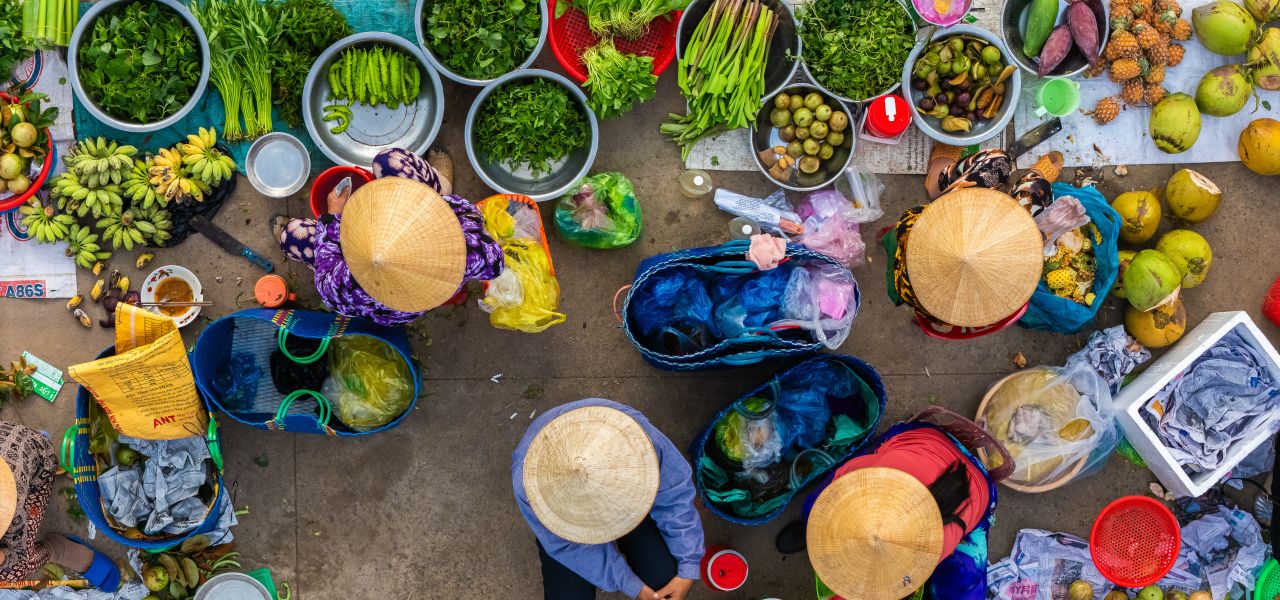
Vietnam Adventure Trip Notes
- Ways to Travel: Guided Group
- Destination: Vietnam
- Programmes: Culture
-
Activity Level:
2 out of 7 - Easy & Moderate
- 14 Days: Land Only
- Ages: 16+
- Trip Code: AOV
- Carbon Footprint: 57kg CO2e
Trip Overview
Explore Hanoi, Ho Chi Minh City and the best bits in between on this immersive adventure
This classic trip captures the magic of Vietnam: the conservative north, imperial cities, vibrant Ho Chi Minh City, the Mekong Delta, and the iconic Ha Long Bay, where we spend the night on a traditional junk sailboat. Guided by an expert local tour leader, we come face to face with an outgoing culture, where so much goes on in the streets: eating, washing, commerce and impromptu games. This intoxicating parade of Vietnamese life may be our strongest memories, as much as the mystical landscapes and world-renowned cuisine.
At a Glance
- Accommodation: 3 Superior nights (hotels), 8 Classic nights (7 hotel, 1 boat), 2 Simple nights (1 homestay/guesthouse, 1 sleeper train)
- Group normally 4 to 16, plus leader
- Post-tour Angkor Wat extension (from Ho Chi Minh City) available
Highlights
- Immerse yourself in the best of Vietnam: grand landscapes, smiling locals and traditional culture
- Stay on a traditional junk boat among the otherworldly peaks of Ha Long Bay
- Navigate the Mekong Delta on a traditional wooden boat and stay in a welcoming homestay-style guesthouse
- Tour the two cultural powerhouses of Vietnam: Hanoi and Ho Chi Minh City
- Uncover the life of a Nguyễn ruler in Hue’s Imperial Citadel and Forbidden Purple City
- Explore Hoi An, a living museum and the original European trading port in Vietnam
Is This Trip for You?
This trip is rated Activity Level 2 (Easy & Moderate). For more information on our trip gradings please visit the Activity Level Guidelines page. If you have any queries about the difficulty of the trip please do not hesitate to contact us.
This is an activity-packed adventure encompassing the highlights of Vietnam, ideal if you love to combine culture and natural wonders. We travel by private minibus and take one internal flight to allow you to experience the best of this beautiful and diverse country in two weeks. In the north, around Hanoi and Ha Long Bay, the weather can be hot and humid and cold in winter. Some days are fairly long and tiring, with long travel days.
Group
Our Vietnamese leaders are very popular with their incredible knowledge, passion and hospitality. There’s no better way to experience Vietnamese culture than letting a local guide show you around.
Adult min age: 16
Min group size: 4
Max group size: 16
Itinerary

Land Only
- Start City: Hanoi
- End City: Ho Chi Minh City
Land Only Itinerary
Depart London

The day is free to recover from the flight or stroll down broad tree-lined avenues dating from the French period. There is a faded colonial feel to the Vietnamese capital, where baguettes and good coffee are sold from doorways of grand buildings from a past era. This evening, we have a welcome briefing followed by an optional group dinner at a local restaurant.
Accommodation: Babylon Grand Hotel & Spa (or similar)
The day is free to recover from the flight or stroll down broad tree-lined avenues dating from the French period. There is a faded colonial feel to the Vietnamese capital, where baguettes and good coffee are sold from doorways of grand buildings from a past era. This evening, we have a welcome briefing followed by an optional group dinner at a local restaurant.
Accommodation: Babylon Grand Hotel & Spa (or similar)
Today, we embark on a sightseeing tour of Hanoi, which includes: a visit to the Temple of Literature; the site of the oldest university in Vietnam; Hoa Lo Prison; and the Old Quarter. Another stop is the grounds of the Presidential Palace, where former prime minister Ho Chi Minh refused to live in the grand structure for symbolic reasons. We visit his traditional Vietnamese stilt house here. In the evening, there is the option to watch a traditional water puppet show.
Accommodation: Babylon Grand Hotel & Spa (or similar)

Today, we visit an icon of Vietnam: Ha Long Bay, a World Heritage site where some 3,000 limestone peaks break through emerald waters to create a mystical, magical landscape. To get there, we rise early for the approximately four-hour drive and, upon arrival, board a traditional junk sailing boat, which is also our home for tonight.
After launching, we enjoy a seafood lunch on deck and drift among the forested pinnacles. We also stop at a beach where we can hike up to a viewpoint (it’s quite steep but the vistas are worth it), plus there’s time for a swim in a small sectioned-off area. Additionally, an optional kayaking trip (extra cost) may be available depending on weather conditions.
Back on board, we can pull up a chair on the top deck and watch the sunset together, perhaps with a cold drink from the bar. When it’s time for bed, we have the comforts of twin-share cabins with private bathrooms.
Accommodation: Overnight boat
We continue to cruise around Ha Long Bay, admiring those limestone pinnacles once more, before returning to port mid-morning. We then have a four-hour drive back to Hanoi, where we have a little free time, before transferring to the train station. Here, we board the Reunification Express for our overnight train ride to Hue, 428mi (688km) to the south.
Accommodation: Overnight train
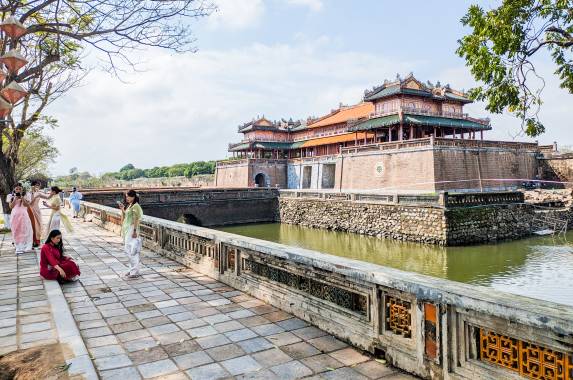
Arriving mid-morning in Hue, we transfer to our hotel to freshen up. In the afternoon, we visit the Imperial Citadel, the standout attraction in the city. Inside its 6mi (10km) long walls are the palaces and halls of the Mandarins, and the remains of the Forbidden Purple City, where only the emperor, his eunuchs and concubines were allowed. The Forbidden Purple City was almost destroyed during the Tet Offensive in the Vietnam War, but the foliage-covered ruins are still atmospheric and the bomb holes a testament to the destruction wreaked upon the country.
We also visit the Thien Mu Pagoda, a centre for anti-government protest in the early 1960s. It houses the Austin car that transported monk Thich Quang Duc to Saigon where he burned himself in protest against the president. The photograph of his self-immolation in 1963 was printed in newspapers around the world.
Accommodation: Park View Hotel (or similar)
After breakfast, we visit the tomb of Tu Duc, one of the most extravagant mausoleums of the great Nguyen emperors. Designed by Tu Duc himself, it was completed in 1867 but the excessive nature of the project sparked unrest and even an attempted coup.
After, we head back to Hue, where we have a free afternoon to explore the historic centre or relax by the river and absorb the sights.
Accommodation: Park View Hotel (or similar)
Leaving Hue, our 81mi (130km) drive passes through the beautiful peninsula of Lang Co, between a crystalline lagoon and the Eastern Sea, and then passes over the Hai Van pass (Pass of the Ocean Clouds) where the views are stunning. In Da Nang, we stop for lunch before we climb Marble Mountain, where we explore large caves used by the Viet Cong as a hospital base during the war. From the mountain peak, there are fantastic views over My Khe beach and the countryside leading to Hoi An, where we spend the next three nights.
Accommodation: Hoi An Sincerity Hotel & Spa (or similar)

This morning, we have a walking tour of Hoi An, the original European trading port in Vietnam, which dates to the mid-16th century. It is now a living museum, with attractive wooden merchants’ houses and pagoda-style temples with Chinese, Japanese, Vietnamese and European architectural influences. It is also a marvellous place to wander around and enjoy the thriving riverside market and great silk clothes shopping.
This afternoon is free. One popular option is to jump on a bike for a ride through the countryside, passing local markets, schools and villages before continuing to Cua Dai beach (3mi/5km).
Accommodation: Hoi An Sincerity Hotel & Spa (or similar)
This morning, we visit My Son, the spiritual home of the Cham civilisation, where Cham kings were buried as early as the fourth century. Although bombing has destroyed much of the site, there are several interesting stone towers and sanctuaries. Upon returning to Hoi An, the rest of the afternoon is free to carry on enjoying this historic town.
Accommodation: Hoi An Sincerity Hotel & Spa (or similar)
We drive to Da Nang and then fly to Ho Chi Minh City, an exciting and absorbing metropolis where scooters pack the streets and temples stand alongside modern developments. Devastated by the Vietnam War, it is now a bustling free-market city where almost anything goes. This afternoon’s walking city tour includes a visit to the Ben Thanh Market, Reunification Palace, Notre Dame Cathedral and War Remnants Museum. The museum has an interesting photographic record of the Vietnam War but please be aware that some of the images are very graphic.
Accommodation: Huong Sen Hotel (or similar)
Today, we head north to the Cu Chi Tunnels, a mazey subterranean network that stretches some 75mi (121km) over three levels. Though construction started in the late 1940s, they became infamous during the Vietnam War, when Viet Cong fighters used them to hide, spring surprise attacks through trapdoors, and store food and weapons. Now, they provide an extraordinary look into the hardships faced throughout the war.
During our visit, we see tank and aircraft remnants and visit the war re-enactment zones to learn more about the conflict. We also have the chance to explore the tunnels themselves; though they were once very narrow, some areas were widened to allow tourists to explore the system. If you don’t like tight spaces, you may prefer to stay outside in the sunshine! In the afternoon, we return to Ho Chi Minh City and the rest of the day is free for individual exploration.
Accommodation: Huong Sen Hotel (or similar)
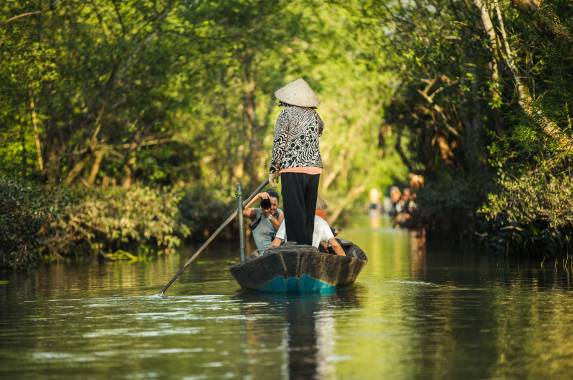
In the morning, we drive (approximately 2hr 30min to 3hr) to the Mekong Delta, which produces most of the country’s fruit, sugarcane and coconuts, earning it the nickname: the rice bowl of Vietnam.
At the Delta city of Vinh Long, we take a wooden boat on the mighty Mekong River to Cai Be. En route, we pass many orchards and friendly locals also travelling by boat and stop to see cottage industries, such as rice paper and coconut candy, with a chance to sample the local produce. The evening is tranquil as we have dinner on an island and enjoy Delta hospitality. We spend the night at a simple guesthouse built in the style of a local house. Bedding, a mosquito net and a small towel are provided.
Accommodation: Mekong Delta homestay-style guesthouse
This morning, we walk through orchards and navigate small canals in a traditional wooden sampan. Later, we rejoin our boat to rendezvous with our vehicle for the journey back to Ho Chi Minh City via a little-visited Cao Dai temple used by devotees of this indigenous religion, which fuses all the great religions of east and west.
Accommodation: Huong Sen Hotel (or similar)
Our Vietnam adventure comes to an end after breakfast. However, you can continue your journey of discovery in Southeast Asia by joining our Angkor Wat extension, where we head to Cambodia to explore the key sites in Phnom Penh, including Angkor, one of the world’s great archaeological sites.
Free time before flying to London. The group flight is usually scheduled to depart Saigon in the late afternoon.
Arrive London
Post-trip Extensions
Angkor Wat Extension (from Ho Chi Minh City)
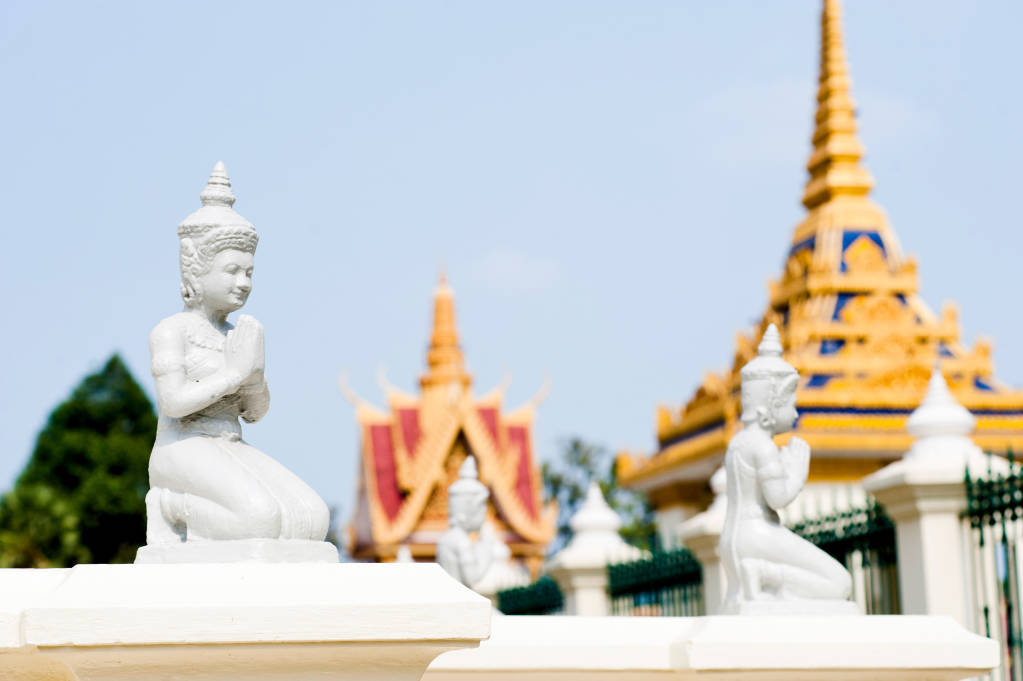
Rediscovered enmeshed in the Cambodian jungle in 1860, Angkor, the ancient capital of the powerful Khmer empire, is one of the finest archaeological sites in the world. Built between the ninth and 13th centuries, the wonderfully preserved sprawling complex of temples and palaces is on a par with any world monument, with magnificent towers, sculptures and bas‐reliefs. During this four-night extension, you will also see all the key sites of Phnom Penh, a fascinating city undergoing a huge amount of change. You travel between the sites in a private car or minibus, depending on how many people take part in the extension, accompanied by an English‐speaking local guide. In the evenings, you are free to enjoy the town. The detailed itinerary can be found here.
Please ask your sales representative for more details. Prices listed are starting prices.
Price per person
£ 1379
Mandatory Single Supplement
£ 490
Accommodation
Hotels, boat, homestay guesthouse and sleeper train

The accommodation on this trip provides an adventurous variety of places to stay. We stay in hotels for 10 nights. We also spend one night on a junk boat cruising Ha Long Bay and one night in a homestay in the Mekong Delta. Finally, we have one night on the Reunification Express, a sleeper train that takes us from Hanoi to Hue.
The accommodations we typically use are on the day-to-day itinerary; however, below are a few of the notable places we stay on this trip.
Ha Long Bay cruise
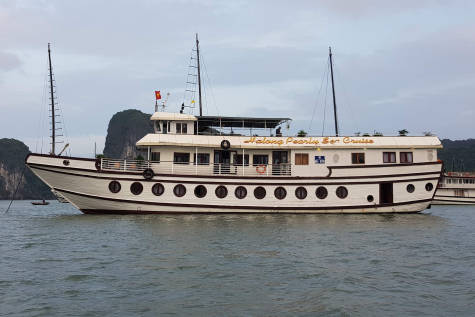
Board a traditional junk boat to cruise among the magnificent limestone karsts of Ha Long Bay. Each of the twin-share cabins has air conditioning and a window out to sea, while the boat has a rooftop deck with chairs – this is where most of our travellers tend to gather for views over the bay. There’s also a dining room with glass windows so we can continue to admire this extraordinary landscape during lunch and dinner.
Reunification Express
Our sleeper train takes us from Hanoi to Hue – a classic journey in this part of the world. It’s an essential part of the tour, linking two special destinations without flying or a lengthy coach trip. However, trains in Vietnam are not luxurious and it’s best to come prepared to maximise your experience – we’ve found extra warm layers to combat the air conditioning and ear plugs can provide a little more comfort! We stay in mixed-gender soft-bed berths, usually four passengers per berth. The trains here are safe but, as with any trip, we recommend you keep valuables with you. Snacks are normally offered on board and most trains have Western-style facilities, but some are equipped with squat toilets.
Mekong Delta homestay
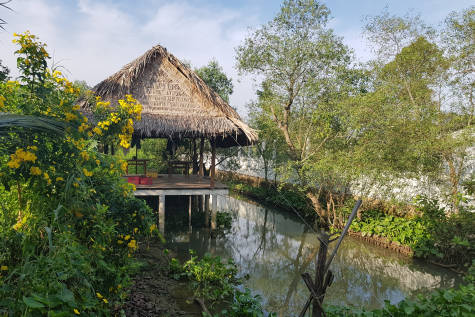
Our time in a guesthouse allows us to experience true Delta hospitality, as we are looked after by local people and stay by the Mekong River. The rooms are relatively basic; bedding, a mosquito net and a small towel are provided, while there are shared bathroom facilities with a shower. The real highlight though is the hospitality of our hosts, the lush garden, and the food (homemade southern Vietnamese cuisine).
Worth knowing
- Single supplements are available (on request) but only for 10 nights of the trip (hotel nights). Please advise your sales representative at the time of booking if you would like to request a single supplement.
- Private bathroom facilities are not available at the Mekong Delta homestay or the overnight sleeper train.
- The accommodation listed in each location on the day-to-day itinerary are the standard hotels used. However, there may be some departures where groups stay at similar hotels of the same standard and quality.
Single supplement from £ 320
Food & Drink
There are 12 breakfasts, one lunch and two dinners included on this trip.
For many, the culinary offerings in Vietnam are a highlight. Across the country, the influence of the Chinese and French is still strong and you’re just as likely to be offered a banh mi (stuffed baguette) as you are a flavour-packed bowl of pho (noodle soup).
Be sure to seek out the national beverages: Vietnamese coffee is served iced and sweet with condensed milk, a real sugar and caffeine hit, and beer hoi (local beer, brewed daily) is served on most street corners in the north out of large plastic jugs that are perfect for sharing.
Food is cheap in Vietnam and you can generally avoid the spicier dishes if you wish. Western food is readily available almost everywhere, except for the night in the Mekong Delta.
Vegetarian meals are widely available; however, the offering is fairly similar in most places. Please advise at the time of booking if you have any dietary requirements.
Transport
Throughout the tour we use a private coach/minibus, usually with air conditioning. Road conditions are generally good and improving all the time in Vietnam. However, progress can be slow in the main cities due to traffic.
The trains are normally on time, but you may experience delays and departure times can change without notice. Boats are used at various points in the itinerary; these are nearly always private and vary from converted trawlers to small riverboats.
Tet Holiday Period (Vietnamese New Year)
During the Tet holiday period, 28 January to 3 February 2025 and 16-21 February 2026, our itinerary is subject to minor change as, despite booking hotels and trains in advance, rooms and seats are difficult to obtain during this busy festive period when people are travelling home to celebrate with their families. It is unlikely that changes will occur, but if required, suitable alternative premium accommodation will be used.
Weather & Seasonality
There is no bad time to visit Vietnam; it is quite pleasant any time of year, though due to the shape of the country, it is unlikely the weather is perfect for the duration of any trip.
There is quite a range of seasons between the north and south: the south up to Hue has a distinct dry season between December and April and then a rainy season from May to November, when rain comes in short heavy bursts with bright sunshine in between. Hanoi is cool in autumn, and even gets chilly between November and February (with drizzly rain).
Ha Long Bay: Our junk boat trip is subject to short-notice change if adverse weather conditions develop. These could occur year-round, but especially in monsoon season (October-April). Ha Long Bay boat trips are governed by the local authorities, who are authorised to make such appropriate safety decisions. If your Ha Long Bay trip is affected by adverse weather, this could either result in a reduced excursion on Ha Long Bay or, less likely, the need to re-arrange the itinerary if it is not possible go out on Ha Long Bay. While this is not a frequent occurrence, our local team and leaders are well equipped to handle such situations and have long offered appropriate options where this occurs.
Angkor Wat extension: The weather is hot and humid year-round in Cambodia. The dry season is late October to May and the monsoon is normally between May and October, though there is an obvious transitional time between those settled periods.
The dry season is as it sounds, with hot days and generally clear skies, though you can expect the odd shower. The monsoon is characterised by short, sharp bursts of rain and is generally overcast all day though this does not detract from the enjoyment of the place; you just need to take an umbrella or buy a cheap local poncho.
Joining Instructions
Key information
Recommended arrival time: You can arrive at any time today. There is a welcome briefing in the evening, but if you miss it the leader will update you separately
Airport: Noi Bai International Airport (HAN)
Getting to the start hotel
The start hotel is approximately 30-60 minutes’ drive (traffic dependent) from the airport. Exodus provides free arrival transfers to the start hotel from the airport for all customers.
Catching your return flight
Exodus provides free departure transfers for all customers to Ho Chi Minh City Airport (SGN) from the end hotel.
Please note, unless specified otherwise, the transfers will be to the start (or pre-tour) hotel and from the end (or post-tour) hotel and will be on the date on which the tour starts/ends; transfers to other hotels in the same city and/or on different dates may attract an extra charge. Transfers should be booked with your sales representative at least two weeks before the tour starts.
Full joining instructions including local emergency numbers will be sent to you as part of our Final Joining Instructions. If you do not receive these at least a week before departure, or require them earlier please contact our office or your travel agent.
Location start: Hanoi
Location end: Ho Chi Minh City
What To Take
Essential Equipment
- Casual clothes. We recommend light cotton clothing for most of the trip, though it will be cold in Hanoi between November and early March and you should bring a warm jacket, woolly hat, and trousers (pants) if you are travelling at that time
- A first-aid kit is carried on each trip, but you should bring your own with diarrhoea treatment, painkillers, rehydration sachets, plasters (band-aids) and a blister-treatment kit.
- Insect repellent containing DEET
- Overnight bag. For the night in Ha Long Bay and the Mekong Delta, you must leave your main bag at the previous hotel for the night
- Warm clothes/layers for the overnight train journey, especially in the cooler months
There are plenty of opportunities to get laundry done locally at a very affordable price so it’s fine to pack light.
Internal flights in the destination country are subject to a 44lb (20kg) weight limit. As advice about luggage allowances for both hand and hold luggage is subject to change, we suggest you check the airline website for the latest information prior to your departure.
Water included
Plastic bottles are a big issue in many countries where recycling isn’t yet widely available; they often end up in landfill or get burned. Both processes are harmful to the environment and we would like to reduce our impact here. For your trip, we provide an alternative to single-use plastic bottles to reduce the plastic used. This means that safe drinking water will be available throughout; all you need to do is bring a bottle to refill along the way. Please add this to your packing list.
Optional Equipment
- Lightweight sleeping bag for the overnight train if you are travelling during winter
Practical Information
Passport
To enter Vietnam, your passport must have:
- An expiry date at least six months after the day you arrive
- A minimum of two blank pages
- No water damage
You must provide us with your full name (including middle name/s) as stated on your passport at the time of booking.
Visa
Vietnam
UK passport holders normally do not need a visa to enter Vietnam for visits up to 45 days, while those with a US or Irish passport normally do need a visa to enter. Visa requirements for EU citizens vary by country.
Please note, visa requirements often change and it is your responsibility to obtain any required visas for this trip. Therefore, we recommend that you check with the nearest embassy or consulate of your chosen destination(s), including any countries you may be transiting or transferring through. Some local governments provide guidance on what visas their citizens need. To help, we’ve gathered a selection of useful links below.
• Australia: www.smartraveller.gov.au/destinations/asia/vietnam
• Canada: www.travel.gc.ca/destinations/vietnam
• United Kingdom: www.gov.uk/foreign-travel-advice/vietnam
• USA: www.travel.state.gov/content/travel/en/international-travel/International-Travel-Country-Information-Pages/Vietnam.html
Vaccinations and Health
Vietnam
There are no required vaccinations. However, you may want to speak to your doctor or travel clinic about vaccinations for hepatitis A, tetanus, typhoid, cholera, hepatitis B, Japanese encephalitis, rabies and tuberculosis. The risk of malaria is slight, but you may want to consult your doctor or travel clinic for further advice.
Similarly, dengue and zika, both viral diseases spread by mosquitoes, are known risks in Vietnam. There is currently no vaccine or prophylaxis available, so we strongly recommend you take the usual precautions to avoid mosquito bites.
Local Time
Vietnam's time zone: Asia/Ho_Chi_Minh (UTC +07:00)
Electricity
Vietnam's electricity: Plug types A (two flat pins, US standard), C (two round pins, European standard) and F (two round pins) – 220V, 50Hz
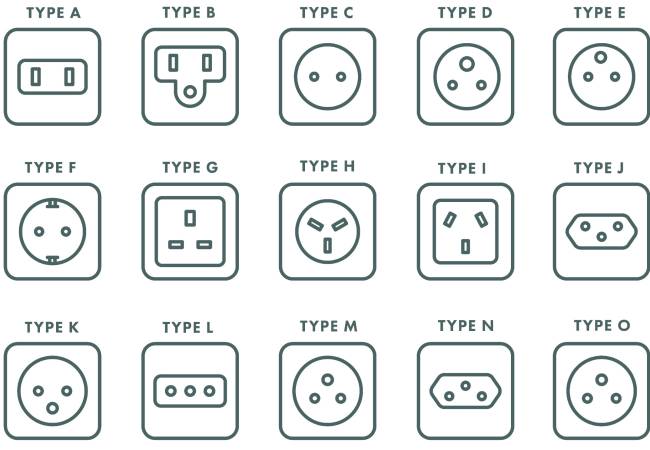
Money
Vietnam's currency: Vietnamese dong (VND)
ATM Availability
ATMs are now widespread in Vietnam and are the easiest way of obtaining money. It is possible to draw a maximum 2m Vietnamese dong (approximately US$80) in major cities in one go. Credit card acceptance is now widespread in cities in Vietnam at restaurants and shops catering for tourists.
If you would like to bring cash, there are many opportunities for you to change this. US dollars and British pounds can both be exchanged. As you will probably carry much of your money in cash, we strongly recommend using a money belt.
Extra Expenses & Spending Money
You need about 7.4m-8.9m dong (US$300‐US$360) for all other meals, which allows you to eat well. Also allow money to cover drinks (more if you like beer/alcohol) and souvenirs.
Optional excursions
There are several optional activities, which your tour leader can help arrange for you and advise of costs locally.
Hanoi
- Water puppets 150,000 dong (US$6)
- Hanoi street food experience: 765,000 dong (US$30)
Hue
- Hue royal street eat experience: 1.3m dong (US$50)
Hoi An
- Tu Bon River boat trip: 180,000 dong (US$7) depending upon numbers
- Hoi An food adventure: 970,000 dong (US$38)
- Hoi An bike and boat with sunset view and home-cooked dinner experience: 1.5m dong (US$58)
Ho Chi Minh City
- Street food by night experience: 1.2m dong (US$46)
Tipping
Tipping is at your discretion but is customary in Vietnam. To take the hassle out of tipping, the leader will suggest you contribute approximately 900,000 dong (US$36) per person to a tipping kitty. This is used by the leader to tip drivers, hotel staff, boat staff etc but is not used at restaurants.
In addition (entirely at your discretion), a tip for the leader at the end of the trip is greatly appreciated. As a guideline, we recommend each person budgets 100,000-180,000 dong (US$4-US$7) per day for the tour leader.
Sustainability and Impact
As a certified B Corp, we’re on a mission to improve our social and environmental impact across all our adventures.
We do this through our innovative Thriving Nature, Thriving People plan.
This ‘nature positive’ approach is designed to help nature and communities thrive in harmony though practical solutions, such as reducing carbon and waste on our trips, supporting conservation projects through the Exodus Adventure Travels Foundation, and rewilding 100 square metres for every Exodus traveller.
Important Information
Water safety
This trip includes time by a lake, river or sea, where there may be opportunities to swim. You should always seek local advice before deciding whether to swim. Open-water or wild swim spots should be treated with extreme caution. Information on how to keep yourself safe while swimming is shown here.
Your safe participation
When booking this trip, you should be confident in your ability to participate in all activities described in these Trip Notes. If you have any doubt about your suitability, please call us and ask to speak to one of the experts on this itinerary.
Although our leaders are well trained to deal with different capabilities, if they have any concerns about someone’s ability to safely take part in an activity, or their impact on other people’s enjoyment, we authorise them to take necessary action which, in some circumstances, may involve asking someone to miss that activity.
By booking this trip you agree to our Booking Conditions which clearly state that our leaders have the authority to do this. In these rare instances we will ensure anyone sitting out is safely provided for and offered alternative options where possible. Refunds will not be provided for activities missed and customers may be liable for additional costs incurred.
Seatbelts
All vehicles used by us should be equipped with working seatbelts, except where approved by us based on the vehicle type or journey. Wherever seatbelts are available, we require our customers to use them for their own safety, even where it may not be a legal requirement.
Insurance – are you adequately covered?
It is a condition of joining any of our trips that you must be fully insured against medical and personal accident risks (to include repatriation costs and air ambulance or helicopter rescue services where appropriate). On arrival in destination for your trip, you will be asked to present details to your leader or local representative of your policy.
If you are resident in the UK, we strongly recommend the Exodus travel insurance policy, this is specifically designed to cover all activities on your trip. If arranging your own policy, please ensure you are covered for all activities that are part of the trip, optional activities that you intend to take part in and/or on high-altitude itineraries, that you are covered up to the maximum altitude of the trip.
This trip goes near an area deemed unsafe to visit by the UK government’s Foreign, Commonwealth and Development Office, whose advice we follow when operating our trips. While our itinerary doesn’t go to these areas, you should familiarise yourself with your local government’s advice if you are planning any pre- or post-trip travel. Any independent travel to areas currently against your local government advice is entirely at your own risk and unlikely to be covered by your travel insurance.
How To Book
- Check availability: Go online to check availability, or contact us by phone or email.
- Secure your place: You can provisionally hold a place on this trip, usually for between three and seven days.
- Complete your booking and payment
When you’re ready to book, go to our website for online bookings, book over the phone or you can complete a booking form (available online or on request by calling us). We accept all major credit and debit cards, or you can pay be cheque.
After booking
You will receive your booking confirmation letter and invoice, which includes extra information and guidance about your travel arrangements.
Full joining instructions, including local emergency numbers and details of how to reach the start point, will be sent to you approximately two to three weeks prior to departure. If you do not receive these at least a week before departure, or require them earlier, please contact our office or your travel agent.
Trip Note validity
These Trip Notes are valid from the “Current as” date on page one. They will occasionally be updated after booking and before departure; if there are any updates that significantly impact the inclusions or itinerary, customers will be written to separately. They will also receive a link to the most up-to-date Trip Notes with their Final Joining Instructions before travelling.
The information in these Trip Notes is given in good faith. Where differences exist between the Trip Notes and our current brochure or website, the Trip Notes supersede the brochure and website. All holidays can be subject to unexpected changes; to enjoy them you should be prepared to be flexible where necessary. Occasionally, it may not be possible to follow the itinerary as planned. This may be for a variety of reasons – climatic, political, physical or other. In these circumstances we will make the best-possible alternative arrangements that maintain the integrity of the original itinerary.
Licensing
Exodus is fully licensed and bonded as a tour operator. We hold Air Traffic Organisers Licence (ATOL) number 2582, issued and bonded with the Civil Aviation Authority (CAA). We are also bonded to the International Air Transport Association (IATA) and we are members of the Federation of Tour Operators (FTO) and ABTA – The Travel Association. This means you can book your Exodus holiday with confidence, as all money paid to us for your trip is fully protected.